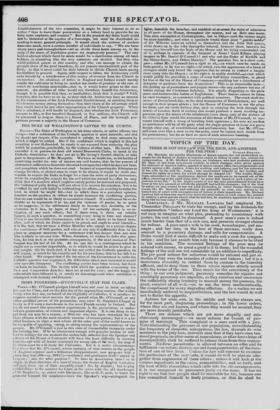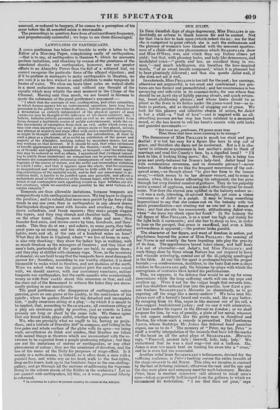THERE IS NOT ONE LAW FOR THE RICH, AND ANOTHER
TOPICS OF THE DAY.
" Mr. Marriott, the worthy Magistrate of Queen-square, has set an excellent ex- ample for the Bench of Judges in superior courts to follow in crim. con. actions for compensation. A Mr. Michael Lawless, an Irishman, who had probably gathered his ideas of law from two recent verdicts in which damages were given against the seducers of married ladies, applied at Queen-square office for compensation and justice against an.. Andrew Jones for washing and lodging, and for the seduction of big wife by the said Mr. Jones, who represented himself as her brother, and abused his rights as a man, for .svhich damage 'he charged !Is.' 'The worthy magis- trate, astonished at the application, desired the applicant to be turned out of the office, observing at the same time, that " he never had heard of such a piece of im- pudence in his life.' In the higher courts of law the only astonishment would have been at the low amount at which the plaintiff had laid his damages ; but if the hint be taken, we may expect to see my Lord Tenterden, or Chief Justice Best, turning round, like Mr. Marriott, and ordering the plaintiffs in crim. con. actions to be turned out of court with an expression of horror at their impudence. Mr. Michael Lawless had at least one merit over more elevated suitors in such cases, fer, instead of making a great parade about what he had lost, he modestly appraised it at some- thing like its real value."—Globe.
CERTAINLY, if Mr. MICHAEL LAWLESS had employed Mr. Counsellor PHILLIPS to state his wrongs, and lay his demands for compensation " before our Lord the King at Westminster," it is not easy to imagine on what plea, pretending to consistency. with justice, his suit could be dismissed. A poor man's case is indeed much harder than that of ,a rich one, and presents stronger claims for redress. A poor man's wife is his cook, housekeeper,' and ma- nager ; and her loss, in the loss of these services, really does amount to a pecuniary damage, and calls for compensation. A Duke would find it more difficult to make out a case for compen- sation ; and the law assists him only because it chooses to be blind to his condition. The wounded feelings of the poor may be solaced with money, so great a good is it to them; but the wounded feelings of the rich are not consolable by an addition to superfluity. The per quod actions for seduction would be rational and just re medies if they were the remedies of coblers and tinkers ; but it is a monstrous absurdity to restrict them by custom to the tolerably affluent, and to deny them to those whose injuries strictly accord with the terms of the law. Thus much for the consistency of the thing : in our own judgment, pecuniary remedies for injuries not essentially pecuniary are impolitic, as they sanction and encourage the sufficiently strong tendency to account money the panacea, the good, curative of all evil,—or, to use the term mathematically, the compliment for every degrading affliction. As a nation we are inordinately addicted to acquisitiveness, and the law would do well not to flatter the appetite.
Actions for crim. con. in the middle and higher classes are, for the most part, disgusting proceedings ; in the lower orders, where they are not known, and where they would be scouted, they are more morally justifiable.
There are actions which are yet more stupidly and mis- chievously encouraged—we mean actions for breach of jpro- mise of marriage. This complaint is a sure card with a jury. Notwithstanding the pressure of our population, notwithstanding the frequency of domestic unhappiness,.the law, through its wise ministers in the jury-box, instructs men that if they have once ten- dered proposals, no after-sense of imprudence, or after-knowledge of incompatibility shall be suffered to.release them from their engage- ments. No locus pcenitentia is allowed between an offer and its fulfilment—or rather, there is one sad locus pcenitentite, of the dura- tion of one of two lives. Unless the law will consent to examine the particulars of the contracts, it would do well to abstain alto- gether from cognizance of these affairs : unless it will look at the various ingredients in the cases, compatibilities, and so forth, and the host of little absurdities which enter into the dis-arrangements, it is not competent to pronounce justly on the issue. lt -has no right to say that two people shall be miserable for life, because one has committed himself to hasty promises, or that he shall be amerced, or reduced to beggary, if he comes to a perception of his error before the ill-assorted union is irrevocable.
The proceedings in question have been of extraordinary frequency, and preposterously successful ; we hope to see them discouraged:



















 Previous page
Previous page